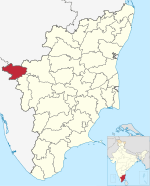| This article includes a list of general references, but it lacks sufficient corresponding inline citations. Please help to improve this article by introducing more precise citations. (February 2015) (Learn how and when to remove this message) |


Mango Orange, officially spelt ‘mangorange’, is a small village in the Nilgiris district of Tamil Nadu, India. The village is dominated by tea estates. Most of the population is employed in the tea estates and there are a few schools, churches and mosques dotted around the undulating terrain.
Location
Mango Orange village is 30 km from Sulthan Bathery in Kerala and 25 km from Gudalur in the Tamil Nadu State of India. It is located at an altitude of 880 metres above sea level.
History
During the nineteenth century, a London-based mining company made a township in the village and also built a Christian church and a race course. When there was no further scope for mining, the British investors shifted to plantations. Coffee and tea plantations were created in a massive scale. Many European people settled here and supervised the work. A large number of Indians from the Malabar region were employed in the estates.
Tourist Village in Tamil Nadu, India| Mango Orange | |
|---|---|
| Tourist Village | |
| Coordinates: 11°29′48″N 76°20′09″E / 11.49676°N 76.33597°E / 11.49676; 76.33597 | |
| Country | |
| State | Tamil Nadu |
| District | Nilgiris |
Demography
At present, the whole village is dominated by tea estates of Tantea or Tamil Nadu Tea Plantation Corporation Limited, Harrisons Malayalam Limited of the RPG Group and Parry Agro Industries Ltd of the Murugappa Group. This village is a sacred place for the aboriginal communities like the Paniyas, Kurumbas and Kattu Nayakas. Today the population of the village is a mixture of migrated Sri Lankan Tamils, Gowdas and Kerala Muslims. The village is famous for small-scale gold mining activities conducted by the tribal people.

Elephant attacks
In 2016, Mango Orange village filled national headlines because of a series of deaths from elephant attacks.
Gene Pool Garden
The Tropical Gene Pool at Nadugani junction, with an area of 2424 acres, boasts 47,000 species of plants. Also found here are a museum of butterflies. accommodation, and trekking facilities.
See also
- Pandalur
- Devala
- Vaduvanchal town
- Meppadi town
- Gudalur, Nilgiris city
References
- "Man killed in elephant attack inside forest". Thehindu.com. 9 June 2015. Retrieved 17 November 2021.
External links
- Bharatmap.in
- Indiamapia.com
- History of Mango Range village and personal experience of Sinna Dorai
- Narration and photograph by Poorna and Brinda
| Nilgiris district | |||||||||||
|---|---|---|---|---|---|---|---|---|---|---|---|
| District headquarters |  | ||||||||||
| Country | |||||||||||
| State | |||||||||||
| Region | |||||||||||
| Divisions | |||||||||||
| Taluks | |||||||||||
| Revenue blocks | |||||||||||
| Municipalities | |||||||||||
| Towns and villages |
| ||||||||||
| Geography |
| ||||||||||
| History | |||||||||||
| Protected areas | |||||||||||
| Transport | |||||||||||
| Related | |||||||||||
This article related to a location in The Nilgiris District, Tamil Nadu, India is a stub. You can help Misplaced Pages by expanding it. |